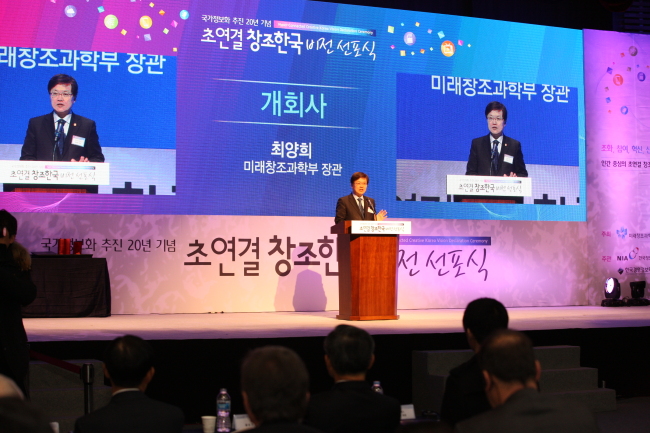The South Korean government has set forth a new vision for enabling the country to achieve sustainability through information technology amid the dawning of the Internet of Things era.
In an event commemorating the country’s achievement of connecting the society through IT since 1984 in Pangyo, Gyeonggi Province, Friday, the Ministry of Science, ICT and Future Planning unveiled a road map for the future of Korea’s technology.
The five strategic visions are: developing a digital market where everyone can think and come up with creative ideas, strengthening the country’s software capability, establishing and expanding the economic foundation for sustainability, advancing technology for increased connectivity, and fostering global ICT leaders.
 |
ICT Minister Choi Yang-hee delivers a keynote speech and presents the country’s new IT vision at an event in Pangyo, Gyeonggi Province, Friday. (ICT Ministry) |
“We hope that these visions can be shared with everyone and become stepping stones for the country to leap forward toward a new hyperconnected age,” said ICT Minister Choi Yang-hee in his keynote speech at the event.
“We urge everyone in the public and private sectors to participate and achieve their dreams in the new digital nation,” the minister added.
However, he said that the private sector rather than the government and its public enterprises should lead the way in creating the envisioned economy.
The government said the road map for the new connected era should most of all aim to narrow the digital divide by improving the lives of the underprivileged through IT.
Also, technology enabling hyperconnections of not only mobile devices but also wearables such as glasses should help the country create an environmentally friendly environment.
The country set out its IT initiative to build a connected society in 1984 when it began developing a network infrastructure to back mobile communications.
The ministry said that Asia’s fourth-largest economy should aim to develop a “humanized technology,” allowing everyone not just to collaborate, but cocreate and share value in order to sustain the economy.
“Korea should move to develop a ‘horizontal industry’ (where players and participants treat each other equally) and achieve a paradigm shift,” the ministry said in a press statement.
The country, overall, aims to develop a “creative society” through hyperconnections by 2025.
By Park Hyong-ki (
hkp@heraldcorp.com)








